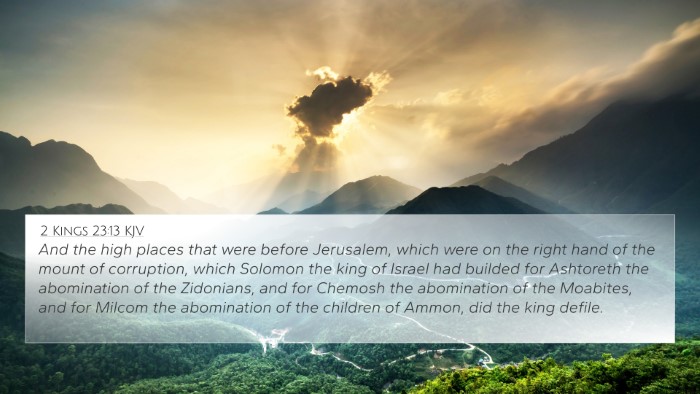Understanding Deuteronomy 32:16
Deuteronomy 32:16 states:
“They provoked him to jealousy with strange gods, with abominations provoked they him to anger.”
This verse serves as a poignant reminder of Israel's covenant relationship with God and their frequent straying into idolatry, leading to divine anger. Below, we will analyze its meaning and implications according to various public domain commentaries.
Summary of Meaning
The fundamental theme of Deuteronomy 32:16 addresses the consequences of Israel's unfaithfulness toward God. The verse indicates that the Israelites provoked God’s jealousy—expressing His yearning for exclusive devotion and loyalty. This provocation arose from their worship of "strange gods," or false idols, which was not merely a breach of the first commandment but also despicable in the sight of the Almighty.
Commentary Insights
- Matthew Henry:
Henry emphasizes the gravity of Israel's sin, noting that their unfaithfulness brought upon them God's rightful jealousy. He discusses that true worship is not simply about rituals but the heart's devotion toward God. The use of "strange gods" highlights the absurdity of turning to idols created by human hands, instead of honoring the Creator.
- Albert Barnes:
Barnes elaborates on the idea of God’s jealousy, which represents His zeal for His people’s fidelity. He points out that the term 'provoked' reflects an active choice by Israel to engage with foreign deities, thus inciting God’s displeasure. Barnes further connects this idolatry to a wider theological theme about the dangers of cultural assimilation and compromise in faith.
- Adam Clarke:
Clarke interprets the “abominations” referenced in the verse as the reprehensible practices that accompanied idol worship, such as child sacrifices and immoral rites. He insists that God’s anger was not merely punitive but also aimed at bringing His people back to sincere worship. Clarke’s context implies that while God is just in His wrath, He is also merciful and calls for repentance.
Bible Cross-References
This verse finds its connections throughout Scripture, emphasizing the continuity of this warning against idolatry:
- Exodus 20:3-5: “Thou shalt have no other gods before me.”
- Deuteronomy 4:24: “For the LORD thy God is a consuming fire, even a jealous God.”
- James 4:4: “...the friendship of the world is enmity with God.”
- 1 Corinthians 10:14: “Wherefore, my dearly beloved, flee from idolatry.”
- Psalm 78:58: “For they provoked him to anger with their high places, and moved him to jealousy with their graven images.”
- Hosea 2:13: “And I will punish her for the days of Baalim, wherein she burned incense to them.”
- Romans 11:11: “Have they stumbled that they should fall? God forbid: but rather through their fall salvation is come unto the Gentiles.”
Thematic Connections
The theme of idolatry and divine jealousy resonates throughout both the Old and New Testaments. By cross-referencing biblical texts, we can see how this notion reflects God's unchanging character and the continuous call to a covenant community to remain faithful.
Application in Modern Context
Today, this verse serves as a caution against allowing anything—be it material possessions, relationships, or ideologies—to take the place of God in our hearts. Understanding the significance of monotheism versus idolatry is vital for a faithful Christian life. The call to fidelity is ongoing, urging believers to examine their lives in light of God’s expectations.
Resources for Further Study
- Bible concordance
- Bible cross-reference guide
- Catechisms on the Ten Commandments
- Commentaries on Deuteronomy
- Tools for Bible cross-referencing
- Inter-Biblical dialogue resources
Conclusion
In conclusion, Deuteronomy 32:16 is a powerful reminder of the consequences of idolatry and serves to provoke serious self-reflection among believers. By utilizing tools for Bible cross-referencing, one can explore the greater message in Scripture concerning fidelity to God and the gravity of turning away from Him. The connections between Bible verses serve to enrich understanding and provide a holistic view of biblical themes.










